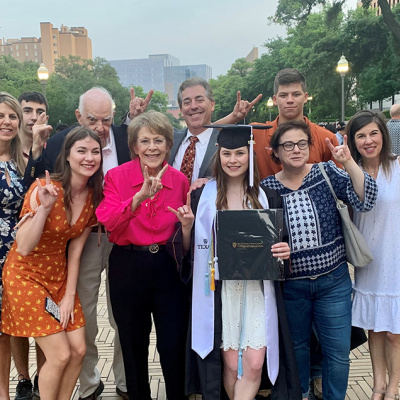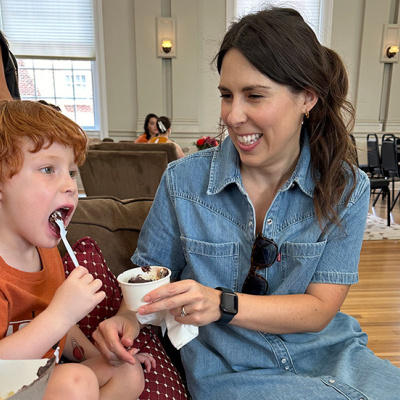After the War: Life As a Texas Vietnam Veteran

Four black, metal K.I.A. bracelets hang on Don Dorsey’s wrists. Each one is engraved with a different name that belonged to a fallen soldier he served with during the Vietnam War in 1969. He had sworn never to forget them upon his return home. “And I haven’t,” he says. “My buddies go with me everywhere.”
Though he replaces a bracelet every so often when the paint chips or the metal breaks, Dorsey, BA ’75, has carried his friends’ names for the past 30 years. He is a former Marine, one of many still grappling with the war, which began in 1955 and lasted for nearly 20 years. Considered one of the most violent in American history, the Vietnam War was an attempt to keep communism from spreading to other countries. But in the process, the U.S. lost 58,220 young lives.

In April, the Lyndon B. Johnson Presidential Library held the first-ever Vietnam War Summit, which was meant to open dialogue about the still highly contentious war. More than a thousand speakers, guests, and veterans participated in the three-day-long event in hopes of gaining some perspective, attaining closure, and moving forward.
Dorsey, who is originally from Port Neches, sat with me in a quiet corner of the LBJ school in between panels. As co-founder and president of the Texas Association of Vietnam Veterans, he was part of the LBJ Library's opening ceremony for The Wall That Heals, a traveling half-scale replica of the Vietnam Veterans Memorial in Washington, D.C. And though he's retired now, for more than 20 years he owned Vietnam Veteran Products, a military memorabilia store in Austin.
Yet for as much as his life revolves around his time in Vietnam, he was never meant to go. Dorsey wasn’t drafted, nor did he support the war. He was four years into a six-year pharmacy program at UT—which made him exempt from the draft—and his grades were good enough that he was set to finish. But at 22, when money became tight and he felt guilty that his twin brother, Ron, was overseas as a Marine grunt, enlisting seemed inevitable. He was tired of people “less patriotic than him” calling him a coward.
“I come from a family of five boys, and all of us are veterans,” he says. “My dad’s a veteran. It wasn't like I was avoiding it, it’s just the time wasn’t right for me to go. I have always trusted my instincts so I knew when it was time.”

So he signed up for a two-year enlistment in the Marine Corps in 1968, graduating at the top of his training class. From there, he volunteered to become a Scout Sniper. A former high school track star, Dorsey’s shallow breathing, naturally slow heart rate, and good hand-eye coordination made him the ideal shooter. "But I never had any fantasies," he says. "In those days, some people considered a sniper to be a murderer." For the next year, he spent his days running two-man killer teams and reconnaissance missions.
While Dorsey was climbing the ranks, UT management professor John Sibley Butler was elsewhere in Vietnam, working as a combat medic. A few days before he was set to speak at the summit, he told me that unlike Dorsey, he was drafted. He too came from a Southern military family and had just finished his liberal arts degree at Louisiana State University when he received a letter in the mail calling him into service. “There was this saying that ‘every generation has its war,’” he says, noting he had little reservation about leaving. “[Serving] was something you did as an American.”
To Butler, it was not a soldier’s duty to ask the “why” of the war but only to do or die. When he remembers Vietnam, he doesn’t think about whether it was justified. He thinks about the helicopter blades from his first flight, how to get a person from the battlefield to an aid station as quickly as possible, and receiving a Bronze Star for an act of valor he won’t discuss.
“It’s interesting being a Vietnam veteran,” he says. “We don’t really talk about what we did. But I saved lives. I didn’t enjoy going to bunkers when rockets were thrown at us but it was something you did—and don’t want to do again.”

He and his fellow soldiers, many of whom were former high school classmates, would sit around talking about their return to the world. But when he boarded a plane home a year later and headed for school at Northwestern University, he came home to a nation divided. One of the first things his sergeant told him to do when he arrived in the U.S. was take off his uniform and “beware the hippies,” though he says nothing could have made him remove his suit.
The nation had reached the peak of the anti-war movement when draft-dodgers abound and those who served were seen by some as warmongers more than heroes. As a black soldier, Butler felt some connection to the Black Power movement but never had any interest in joining the activists. “It was interesting to look at the ideas of the protesters as opposed to those of the soldiers,” he says. “My brotherhood was with those who had served.”
Dorsey, however, took refuge in the counterculture. After 19 months of service, he was honorably discharged as a sergeant and sent back to the U.S. within a week. Like more than 200,000 living Vietnam veterans, he suffered from post traumatic stress disorder, though it would be another 26 years before he was formally diagnosed. He didn’t want to talk about the war and withdrew into the anti-war movement. “I came back, grew my hair out, and just disappeared into the drug world,” he said. “I was smoking a lot of pot just to keep from hurting people.”
He couldn’t make himself go back to pharmacy school, so he switched into the art department, where he felt more comfortable in solitude. “There were a lot of crazies in there so it was OK to be crazy,” he says. “You don't look any different.”
Sitting in a designated room before the opening summit panel, I ask Vietnam Veterans Memorial Fund founder Jan Scruggs what people need to understand about PTSD. “Anybody can suffer from PTSD,” he says. “There’s nothing wrong or abnormal about getting it.”
He had returned from overseas wounded and disillusioned in 1970 before attending American University, where he studied psychology. He researched PTSD, from which he suffered mildly, and eventually testified before Congress. Though he says he doesn’t do psychotherapy, he encourages those affected to get involved with their communities.
“Be gregarious,” he says. “Get involved with people. We cannot just be little hermits living in the desert.”

And that’s just what Dorsey did. He eventually received help, and though he says his PTSD will never go away, he’s learned to live with it. He turned his anti-war involvement into an active way of helping veterans, creating TAVV, a non-profit organization that aims to help all veterans and military members, in 1985. “It gave me a sense of purpose,” he says. In 2013, Dorsey led the creation of the Texas Vietnam Heroes Exhibit, for which he made thousands of dog tags by hand to honor the 3,417 Texans who never came home. A year later, he dedicated the Texas Capitol Vietnam Veterans Monument, a statue of American soldiers he helped craft.
“For an anti-war guy, I sure got caught up in a lot of Vietnam stuff,” he says.
From the historians and political leaders onstage to the audience members sporting troop numbers on caps and cut-up denim jackets, the summit was full of men like Dorsey whose lives are still very much intertwined with their time in the war. Even Sibley, who composed the Economic Advisory Team for President George W. Bush in 2000 and holds the J. Marion West Chair for Constructive Capitalism in the Graduate School of Business, keeps ties with the military by serving as a consultant.
“I think the military is the leader in leadership,” he says.

In 2009, Dorsey was asked to write a short bio for his 45th high school reunion. Instead, he wrote a personal essay about his return home from war. After Vietnam, he had always felt out of place among his lifelong friends and classmates and used his story to help them understand and help himself.
Dorsey says he attended the summit to learn more about the war, giving him a chance to heal, if only a little. In line with the sentiments of most every veteran who told their story at the summit, he wanted one thing to be clear.
“Although I didn’t agree with America's involvement in the Vietnam War,” he says, “I volunteered for service because I loved my country more than I hated the war.”
Photos from top:
U.S. veteran Don Dorsey in Vietnam at Hill 22 in 1969. Courtesy of Don Dorsey.
Dorsey attends the arrival ceremony for "The Wall That Heals" at the LBJ Presidential Library on Friday, April 22, 2016. Courtesy of LBJ Library.
Dorsey as a Marine Sniper at Hill 55 in 1970 Vietnam. Courtesy of Don Dorsey.
U.S. veteran John Sibley Butler in Vietnam. Courtesy of John Sibley Butler.
Dorsey holding dog tags for Texas Vietnam Heroes Exhibit in front of the monument for the Texas Capitol. Courtesy of Texas Capitol Vietnam Veterans Monument.
At left, Vietnam veteran Gary Warrenchuk from Dallas, who served in 1969, talks with a fellow military veteran at the University of Texas at Austin. Courtesy of LBJ Library.
Correction: An earlier version of this story erroneously stated that the U.S. lost more than 500,000 young lives in the Vietnam War. That figure is actually 58, 220 and has been updated here.






